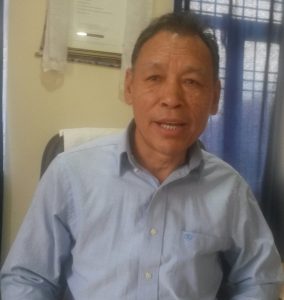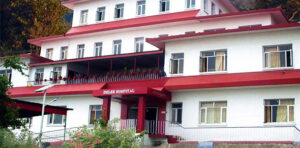This article about Delek Hospital is the first in our new series of articles about the NGOs (non-government organisations) in the Tibetan exile community. Contact is launching this series of articles to highlight the actions, achievements and concerns of the NGOs – to support them in their work and to inform our readers about their activities and the causes they support.

Dawa Phunkyi, Chief Administrator of Delek Hospital
Photo: Lodoe Gyatso/Contact
Delek Hospital is built into the side of the mountain where it stands defiantly but solidly against the laws of gravity. Outside, the road between Dharamshala and McLeod Ganj winds its way up the steep incline past the Central Tibetan Administration head office.
Chief Administrator of the hospital Dawa Phunkyi cuts a similar steadfast look. He started at the hospital in 1987 has been there ever since apart from a three-year break doing a stint at the Department of Health. He has been in his current position for the past ten years. As he speaks, he draws one into the institution and its trials and victories.
Delek Hospital has been in existence for 47 years. In that time it has grown from a small outpatient clinic to a full hospital which has made a name for itself around the world. It provides services to all who need health care without discrimination. For example, 10% of the hospital’s patients are Indian nationals.
The vision for the hospital was first espoused by Tswewang Rinchen Rishing, a man without medical training but with drive and determination. He faced major financial hurdles which he overcame with the help of self-sacrifice. For example, on one occasion he organised a lottery for his wife’s prized Tibetan jewellery. When the overseas winner donated the jewellery back to him, he pawned it and used the funds for construction work. This ethic of service to the community has been a hallmark of the hospital throughout its existence.
Dawa Phunkyi is particularly proud of the fact that all are welcome. Charges at the hospital are minimal. Outpatients are charged Rs 10 (US$ 15 cents / £ 11p) for a doctor’s consultation. If they are admitted to the hospital, patients pay Rs 40 per day, including 3 meals, 2 teas, bed and nursing. The hospital receives no grants from the Tibetan government. Instead it raises the majority of its funds by generous donations from dedicated supporters and contributors worldwide.
The Outpatient Department is situated in the hospital, with a second clinic at the Community Health Centre located next to the Green Hotel on Bhagsu Road in McLeod Ganj. Fifty to sixty patients are attended to each day at the hospital. The Community Health Centre on Bhagsu Road sees a minimum of 15 patients per day and provides services such as ante natal checkups, child immunisations and administration of tuberculosis (TB) medication.
The hospital also provides dental, eye care and pharmacy services.The Inpatient Department has a capacity of 45 beds, the majority of which are occupied by TB patients.The Laboratory and X-Ray Department has a fully digital x-ray machine, ECG and TB screening equipment. The laboratory has facilities for a wide variety of tests such as hepatitis, HIV, lipid profile, sugar, dengue and sputum tests.

Photo: Tibetfreunde
A major part of the history of the hospital is the fight against tuberculosis (TB), and Dawa Phunkyi is very eager to talk about this. A book has been published this year telling this story, entitled Overcoming Tuberculosis: A History of Tibetan Delek Hospital’s TB Program. It highlights the fact that Tibetans have some of the highest rates of TB infection in the world at 431 cases per 100,000 population. As the majority of TB cases are found among the Tibetan youth and children, a new initiative, Zero TB in Tibetan Kids, has been started with the support of Johns Hopkins University. It has as its long-term aim the elimination of TB among Tibetan children in schools, monasteries and nunneries and includes: active TB case finding using the latest diagnostic technology; contact tracing to identify the source of TB infections; using TB prophylaxis to treat children with latent TB and reporting and surveillance to highlight those at risk of infection and disease.
The initial phase of the project will be in Himachal Pradesh and Uttarakhand where over 10,000 schoolchildren and approximately 2,000 young students in monasteries and nunneries will be screened. In the next phase the project will be extended to Tibetan schools across South India.
Delek Hospital is recognised both nationally and internationally as a centre of excellence for the treatment of TB.
Another new development is the construction of accommodation for patients in Chandigarh. This was funded by a Tibetan family in Switzerland.
Asked about obstacles that Delek Hospital is facing, Dawa Phunkyi becomes grave. A continuing concern for the hospital is fundraising. In the past it has been supported by a wide variety of organisations, each of which assisted for a critical period in the history of the hospital. This gives one hope that at the right time a financial backer will be found to take the work forward.
Another concern is the lack of specialist staff such as heart specialists and gynaecologists. Delek Hospital assists by providing diagnostic services and referring patients to the appropriate service provider.
At the end of the meeting one can’t help but to be passionate about Delek Hospital as a vital service to the people of Dharamsala.




 Print
Print Email
Email